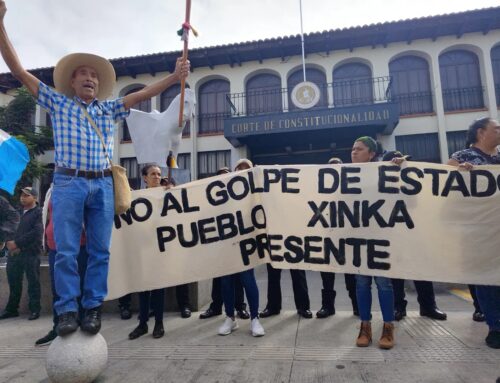Interview originally published by El Periódico in Spanish. Translation by NISGUA.
 |
| Judge Yassmín Barrios Photo: El Periódico |
Judge Iris Yassmín Barrios, presiding judge of the High Risk Crimes Court A, refers to the decision handed down against her last week by the Ethics Tribunal of the Guatemalan Bar Association (CANG in Spanish), in which her professional duties are suspended for a year and she is fined Q 5,040.
Said sanction was motivated by [a complaint filed by] lawyer Moisés Galindo, who felt “humiliated” during the course of the genocide trial against former generals José Efraín Ríos Montt, former Head of State, and José Mauricio Rodríguez Sánchez, former Director of Military Intelligence.
What do you think about the decision of the Bar Association Ethics Tribunal?
-It is an unjust and illegal decision that exceeds its jurisdiction. The competent body to review and rule on judges’ actions is the Disciplinary Board of the Judicial Body. The Board is responsible for carrying out a review in the instance that a judge commits an error, and can then emit a resolution.
If the Ethics Tribunal doesn’t have competence, what actions will be taken?
-In the coming days, you will hear about the actions that follow.
Lawyer Moisés Galindo argued that he felt humiliated when you ordered him to defend the accused (Efrain Ríos Montt)?
-There are many things that are important to clarify. In the first place, no one was ever humiliated. I’m very respectful of others, of their human rights and their jurisdictional activities. There are court proceedings, as well as videos, through which one can see that he was never disrespected.
Secondly, the Disciplinary Board already emitted a resolution related to these same events, in April of last year, in which it rejected the arguments. Also, during the trial [the defense lawyers] presented grounds for our impeachment, but the arguments were declared irrelevant. Thus, the resolution emitted by the Ethics Tribunal is out of order.
You recently received recognition from the First Lady of the United States. Was it motivated by the genocide trial?
-No. It was in recognition of my entire career as a judge. I don’t know why people have focused only on this sentence. It’s necessary to review my entire career, the cases and sentences I’ve ruled on.
I’ve been a part of various court cases. For example, the case of the assassination of Monsignor Juan Gerardi, the case of Myrna Mack, the massacre of Dos Erres, the massacre of Plan de Sánchez, the case of Rodrigo Rosenberg, and a large quantity of assassinations, abductions or kidnappings. It is not just for [the genocide] sentence, it’s for my entire judicial career; I’m talking about 18 years. There are thousands of sentences.
It is believed that the Ethics Tribunal is politicized. What is your opinion?
-More important than what I could say, is the analysis that others make. What I can say is that I’ve never been lacking in ethics, that my actions are honest; I can keep my head high and know that I have never done anyone harm. What I have done is fight for the administration of justice and to return, to all Guatemalan citizens, the credibility of the [justice] system. I have demonstrated that there are still honest judges in the Judicial Body. That there are capable people, obedient only to the Constitution and the laws, to no one else.
What is at risk for the judicial system if the resolution is upheld and you are suspended for a year?
-What is at risk is judicial independence and the rule of law. What does that mean? That anyone without grounds can go and accuse a judge in order to avoid being tried, that the door to impunity and corruption is being opened.
Judicial independence and the rule of law should be respected in our country. Punishing honest judges through illegal mechanisms shouldn’t be allowed because it deteriorates the justice system. No judge should be punished for his or her resolutions. Procedural appeals exist to respond to displeasure over a resolution.
Judicial independence is a guarantee, not just for the judge, but so that the Guatemalan people can count on honest and dignified judges, to whom they can present their cases and be assured they are tried with adherence to the Constitution and the law without favoritisms, neither economic nor political. It is a guarantee for the people before it is a guarantee for the judge.






Leave A Comment